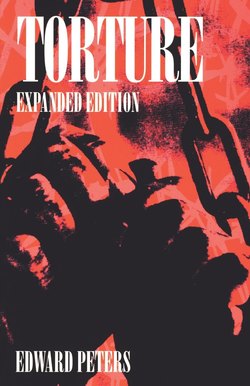Читать книгу Torture - Edward Peters - Страница 6
На сайте Литреса книга снята с продажи.
ОглавлениеPreface to the Expanded Edition
Torture was first published in Oxford and New York in 1985. It was translated into Spanish in 1987 and into Portuguese in 1989 (São Paolo) and again in 1994 (Lisbon). The book had the honor of being removed from the UK exhibit stand at the 1985 Moscow Book Fair. The German translation of 1991 added a very brief bibliographical supplement. The text of the original edition has been left intact with the exception of the correction of a few minor errors.
Because the text has not been changed, several points made by earlier reviewers may be conveniently addressed here. The reviews were encouraging; that paragraphs contain no sour grapes. Two reviewers regretted that the book focused narrowly and specifically on torture without directly linking it to (and discussing) what one called, “all those other crimes against humanity perpetrated by modern regimes, from genocide to the political manipulation of mass starvation.” These are fair points, but the book could not have retained its focus if it had included them in any detail. Perhaps this book may help some other book do so at adequate length and breadth. Another reviewer expressed concern that the book did not describe the experience of the victims in adequate detail. It did, however, indicate where such descriptions could be found, and the anamnestic literature has increased and circulated substantially since 1985. This literature is discussed in the New Addendum to the Bibliographical Essay, pp. 200–210 this edition.
A fourth reviewer raised a more serious problem: the novelist David Bradley, in one of the reviews for which I am most grateful, expressed concern that my insistence on so narrow a definition of torture restricts the application of the term to an excessively narrow field of action, denying it not only to the rhetorical action of writers, but also to instances in which abuse permitted by law might very well fit into a slightly expanded definition. I do not profess to be any more of a policeman of rhetoric than I thought was necessary to clear the air of some of the most misleading uses of the term in modern sentimental journalism. Bradley is right. The definition should be expanded.
Finally, one reviewer resorted to what can only be called the pointlessly instrumental application of heuristic concepts to a book that was originally written to help restrict them. Complaining that I had failed to distinguish in modern history between torture under an “authoritarian” regime and that under a “totalitarian” regime (the heuristic difference apparently being that the former can change policy and the latter cannot), the reviewer neglected to note that it does not matter to victims whether they are tortured by authoritarian or totalitarian regimes. The experience of torture is the same. In any case, the events of 1989 and since suggest that the original distinction needs rethinking.
The main feature of this edition is the two appendices. The first offers a much more extensive bibliographical survey of the literature on both the history and the contemporary practice of torture between 1985 and 1995; the second provides a number of English translations of original documentary sources on the subject from the Roman Empire to the twentieth century. Many of these originally appeared in my edition of Henry Charles Lea, Torture (Philadelphia, 1973), now out of print. I have revised the commentaries to these texts and added relevant bibliographical information.
I am grateful to all those colleagues and friends (and sometimes perfect strangers) who have expressed an interest in seeing the book return to print. I am also particularly grateful to a number of institutions and individuals who have communicated with me about the book in correspondence and conversation and have advised me on bibliographical and other matters. Prominent among these are the RCT in Copenhagen and its director, Dr. Inge Kemp Genefke; Darius Rejali, particularly for his generous and extensive bibliographical suggestions; Rita Maran, Sarah Terry, Mika Haritos-Fatouros, Ronald Crelinsten, James M. Powell, Kate Nelligan, and John Murphy.
